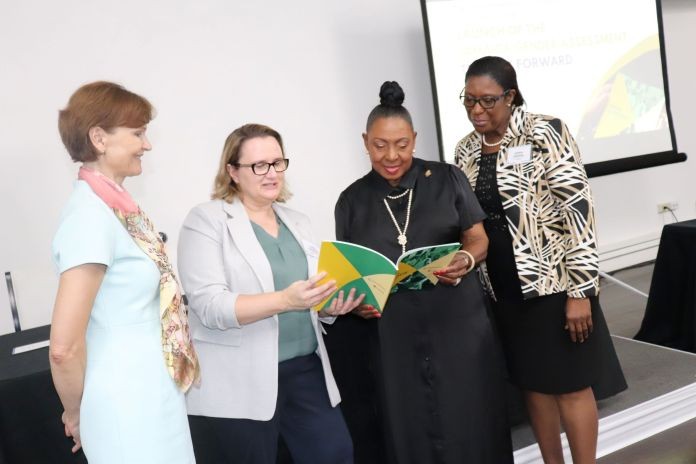KINGSTON, Jamaica – While Jamaica has made significant progress in gender equality, equal access to economic opportunity is still a distant goal. This was a key highlight of the Jamaica Gender Assessment Report, launched today by Canada and the World Bank. The assessment, funded by the government of Canada, reviewed the barriers faced by women and men in Jamaica in the aspects of endowments such as health and education, economic opportunity, and agency.
In terms of economic opportunity, the Gender Assessment found that women’s labour force participation is lower than men’s due to their disproportionate role in unpaid household and care work. However, in contrast, men were found to be more likely than women to hold informal and vulnerable jobs. Despite recent advances, the agency of Jamaican women remains low, and the prevalence of patriarchal social norms is a key constraint to women’s empowerment.
While the Assessment found that the legal framework for gender equality in Jamaica is quite developed, it noted that there is room for improvement, particularly regarding paid work and parenthood. The report further highlighted that women’s sexual and reproductive health remains a concern, as do high adolescent pregnancy rates. Of interest, the Assessment found that Jamaican women outperform other Caribbean countries in entrepreneurship and access to finance, but gender gaps still need to be addressed.
The Assessment was launched at an event hosted by Canada and the World Bank in the presence of key gender equality stakeholders and representatives from national and local authorities, civil society organisations and experts.
“This assessment is an invitation to reflect on what measures can be taken to help bridge gender gaps. As a leader and champion for gender equality, human rights, and the empowerment of women and girls at home and abroad, Canada remains engaged and committed to working with the government and local stakeholders to advance gender equality and create a better, safer, and more inclusive society,’ said High Commissioner Emina Tudakovic at the launch event.
Also present at the report launch was the minister of culture, gender, entertainment, and sport, Olivia Grange, who acknowledged the findings of the report: “I commend the World Bank and the High Commission of Canada for this unique partnership, which has culminated in the launch of the Jamaica Gender Assessment Report to observe International Women`s Day. My ministry has noted the gender-specific recommendations and remains committed to accelerating the investments in human capital development, technology, innovation, legislative reforms, and other key actions to create an enabling environment for women and girls, men and boys. You have my unrivalled commitment to the ongoing advocacy and actions that are required to achieve gender equality.”

The Assessment recommended three key areas of action:
- Investing in building the human capital of women and (especially) young men;
- Expanding, supporting, and promoting the productive role of women;
- Increasing women’s capacity to make decisions and act on them.
It was noted that clear and comprehensive implementation plans will be needed for these policies, as gaps in implementation can hamper reform effectiveness.
“Creating a dynamic and inclusive society and providing opportunities for women and girls to acquire the skills and earnings to succeed should be an economic priority for countries, said Caribbean Country Director with the World Bank, Lilia Burunciuc. “We hope this report will be the impetus needed for the formulation of relevant policy actions to address the issues emerging from the assessment. The bank stands ready to continue our support to Jamaica in this regard.”
The Assessment was conducted through a series of consultations with diverse stakeholders on key gender issues in Jamaica. A total of five virtual sessions were held in each round of consultations to discuss findings and prioritise policy recommendations, involving more than 20 participants from government and civil society organizations, academia, and development partners in Jamaica.
Canada and the World Bank Group have a long history of working together to finance projects, design policies, and deliver programmes to end poverty and create a world based on the principles of sustainable development. Closing the gender gap is a fundamental and shared priority for achieving sustainable economic growth.
The report is available here.






